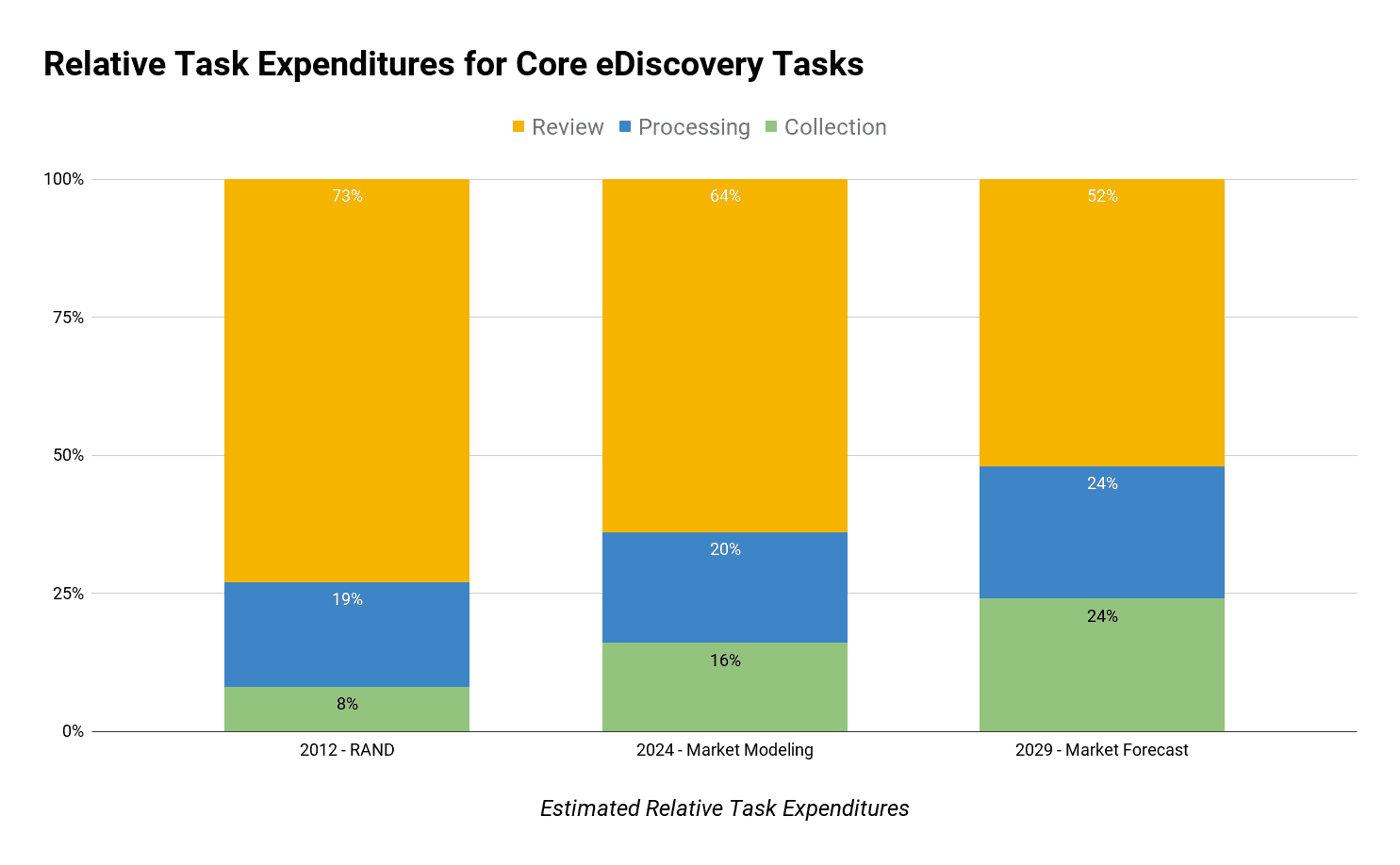Editor’s Note: The 2024-2029 eDiscovery Market Size Mashup from ComplexDiscovery OÜ not only highlights the evolving task allocation across collection, processing, and review but also underscores the strategic opportunity for stakeholders to ramp demand generation efforts. With Generative AI efficiencies reducing costs in the review phase, market participants must align their strategies to capture the increasing opportunities in data-intensive workflows such as collection and processing. For shareholders, this shift emphasizes the importance of investing in technologies and initiatives that drive broader market adoption, expand service offerings, and sustain revenue growth in an increasingly competitive and efficient market.
Content Assessment: First Look: eDiscovery Task Allocation Trends in the 2024-2029 Market Size Mashup
Information - 94%
Insight - 95%
Relevance - 92%
Objectivity - 94%
Authority - 95%
94%
Excellent
A short percentage-based assessment of the qualitative benefit expressed as a percentage of positive reception of the recent article from ComplexDiscovery OÜ titled, "First Look: eDiscovery Task Allocation Trends in the 2024-2029 Market Size Mashup."
Industry Research – Markets
First Look: eDiscovery Task Allocation Trends in the 2024-2029 Market Size Mashup
ComplexDiscovery Staff
As part of the upcoming 2024-2029 eDiscovery Market Mashup from ComplexDiscovery OÜ, scheduled for publication in early January 2025, a comparative analysis of task allocation for collection, processing, and review highlights the evolving landscape of eDiscovery expenditures over time. Using data from the 2012 RAND Corporation study, 2024 market modeling, and the 2029 market forecast, the shifting distribution underscores the impact of technology and data growth on eDiscovery workflows.
Key Insights
Review Dominance is Declining
- In 2012, review accounted for 73% of eDiscovery costs, reflecting the resource-intensive nature of manual document review.
- By 2024, review’s share drops to 64%, and further to 52% in 2029, driven by efficiency gains from Generative AI, technology-assisted review (TAR), and predictive coding.
Collection Gaining Prominence
- Collection’s share of expenditures nearly triples, rising from 8% in 2012 to 16% in 2024 and 24% by 2029. This growth reflects the increasing complexity of data environments and the need for advanced tools to handle diverse sources like IoT, cloud platforms, and multimedia.
Processing Stabilizing as a Critical Component
- Processing costs show a steady rise from 19% in 2012 to 20% in 2024 and 24% in 2029. As data volumes grow by approximately 30% annually, investments in robust data culling, de-duplication, and analytics platforms will be critical to managing exponential data growth.
Chart: Relative Task Expenditures for eDiscovery

Implications for eDiscovery Stakeholders
This shifting allocation highlights the need for organizations to:
- Invest in AI-driven efficiencies to manage review workloads.
- Enhance data collection capabilities to address the expanding variety and volume of data.
- Bolster processing pipelines to ensure data readiness for analysis and review.
- Prioritize demand generation efforts to educate clients on new service offerings, drive adoption of AI-enhanced workflows, and capture opportunities from exponential data growth.
As eDiscovery evolves, these trends reflect an ongoing redistribution of expenditures that aligns with the challenges of handling massive data growth while leveraging cutting-edge technologies.
About the eDiscovery Market Size Mashup from ComplexDiscovery OÜ
The eDiscovery Market Size Mashup from ComplexDiscovery OÜ is an annual analytical report that provides a comprehensive overview of eDiscovery market trends, task-based expenditures, and technological advancements. Leveraging data from historical studies, market modeling, and future forecasting, the Mashup offers actionable insights for legal, business, and technology professionals. By examining key factors such as data growth, task allocation, and the impact of emerging technologies like Generative AI, the Mashup serves as a critical resource for understanding the evolving dynamics of eDiscovery. The 2024-2029 edition of the report will be published in early January 2025.
News Sources
- ComplexDiscovery OÜ. (2024). 2024-2029 eDiscovery market size mashup: Task allocation trends and market dynamics (Unpublished working paper). ComplexDiscovery OÜ.
- The Workstream of eDiscovery: Considering Processes and Tasks
- The Next Five Years in eDiscovery: Market Size Forecast for 2023-2028
Assisted by GAI and LLM Technologies
Additional Reading
- An eDiscovery Market Sizing Chronology from ComplexDiscovery
- eDiscovery Surveys Archives – ComplexDiscovery
Source: ComplexDiscovery OÜ


























